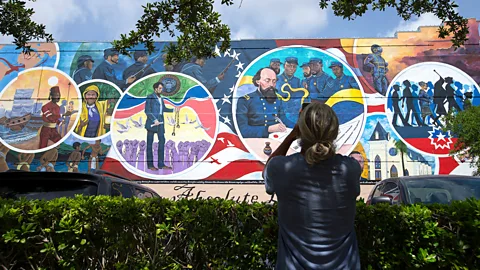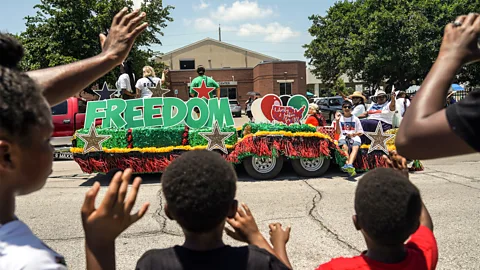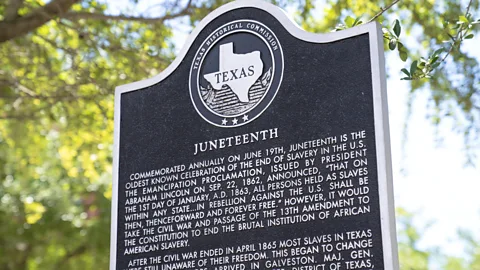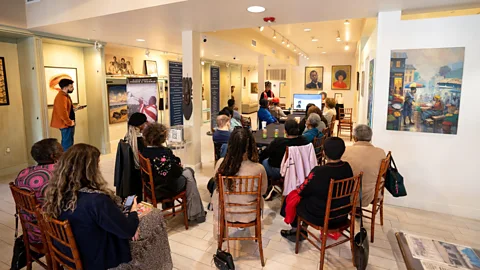The island city where Juneteenth was born
 Getty Images
Getty ImagesOne hundred and sixty years after word reached Galveston, Texas, that enslaved African Americans were now free, the city is honouring Juneteenth year round.
On 19 June 1865, a Union general arrived in Galveston, Texas – then a remote barrier island still under Confederate control – and informed a group of enslaved African Americans that the Civil War had ended and they were now free. Although President Lincoln had signed the Emancipation Proclimation more than two years earlier, declaring all enslaved people in Confederate states "henceforth shall be free", the policy had not been enforced in Texas due to its geographical distance and the minimal presence of Union troops. Black residents reacted to news of their belated freedom with a mixture of shock, disbelief and ultimately jubilation.
These initial celebrations formed the basis of what would eventually become a Texas state holiday in 1980. And as Black Texans relocated across the country and brought their traditions with them, the event became a unified day of celebration in African American communities across the South.
Despite its long grassroots history, Juneteenth only became the US's newest national holiday in 2021 when then-US President Biden signed legislation formally recognising 19 June as a national day of observance. Known variously as Juneteenth (a combination of the words "June" and "19th"), Freedom Day, Emancipation Day or Jubilee Day, it is now marked by parades, rallies and cookouts in cities across the US.
Cities such as Philadelphia, Atlanta and Tulsa host some of the largest celebrations in the US, but in Galveston – where it all began – the island city is embracing its role as the birthplace of what has become a national celebration.
 Getty Images
Getty Images"We have a lot of special events leading up to and on the day of [Juneteenth]," said Mary Beth Bassett, Visit Galveston's senior public relations manager. "But what's more important is that you can come and realise the significance of Galveston as the birthplace of Juneteenth at any time of year."
This year, Galveston marks the 160th anniversary of the original announcement with a packed calendar of events. Alongside its annual parade, fireworks display and community picnic, the city will host a reenactment of the reading of General Order No 3, the proclamation that that brought word of emancipation to Texas, at Ashton Villa, a historic home built in 1859.
Beyond the main day, a series of talks, performances and events kicked off on 11 June and are running into July. Highlights include a short lecture on 21 June about notable African American Galvestonians, such as educator John Rufus Gibson, principal of the first Black public high school west of the Mississippi; and a 21 June conversation with the family of George Floyd, the unarmed Black man murdered by a white police officer whose death sparked the 2020 Black Lives Matter protests across the country.
 Visit Galveston
Visit GalvestonWhile Juneteenth takes centre stage in summer, Galveston locals are working to ensure that the city's African American history is visible and celebrated all year round.
"The narrative of our shared history is incomplete," said Sam Collins, III, a local historian and President of The Juneteenth Legacy Project. "You hear all the time about [the US'] Founding Fathers and early settlers, [but] there are many stories that have been left out. So, the work that we're doing to tell this story is going to help to add to our shared Texas history, US history and world history."
Collins is a driving force behind a planned International Juneteenth Museum in Galveston which will be dedicated to telling the story of how Juneteenth blossomed into a national holiday, while amplifying wider narratives about African American history, past, present and future in Texas.
More like this:
• The illegal church at the heart of US history
• Five historic restaurants that fed the civil rights movement
For travellers interested in exploring Galveston's African American heritage right now, local historian Dr Araminta Coleman Sorrell runs Juneteenth and Beyond tours that explore the history of African American life on the island. Stops include important sites such as the Reedy Chapel African Methodist Episcopal Church, the first Black church in the state; and the NIA Cultural Centre, which is the unofficial heart of Black life in the city.
 Visit Galveston
Visit GalvestonTravellers can also visit the centre's Juneteenth Headquarters and Art Gallery year round, which showcases and sells the work of African American artists, as well as the striking Absolute Equality mural. "The NIA Centre was responsible for erecting this 5,000sq ft mural that starts off with [the] transatlantic slave trade and goes all the way up to the future," explained Coleman Sorrell, who regularly stops at the mural as part of her tours. "It's a fantastic way to talk about Black history."
Several local museums have also created permanent exhibitions highlighting the history of Juneteenth and the contributions of the island's African American population, including And Still We Rise…, an exhibition at Ashton Villa that uses interactive interviews, historical documents and digital touchpoints to bring the past to life. In addition, the city's tourism board has created two self-guided trails: the Freedom Walk tour, which takes visitors to important Juneteenth sites; and the Galveston African American History Tour, which tells a broader historical story of the island's African American community.
"[We] are very supportive of promoting Juneteenth," said Coleman Sorrell. "[The city has] a website for Juneteenth events that makes it easy to find what's going on here, they've offered grants for Juneteenth events. They're not just talking about it, they put [their] money where the mouth is."
--
If you liked this story, sign up for The Essential List newsletter – a handpicked selection of features, videos and can't-miss news, delivered to your inbox twice a week.
For more Travel stories from the BBC, follow us on Facebook, X and Instagram.
